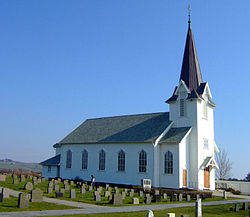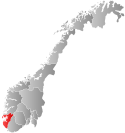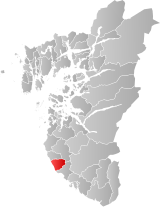Varhaug (municipality)
Varhaug Municipality
Varhaug herred | |
|---|---|
 View of Varhaug Church, the main church for the municipality | |
 Rogaland within Norway | |
 Varhaug within Rogaland | |
| Coordinates: 58°37′05″N 05°39′25″E / 58.61806°N 5.65694°E | |
| Country | Norway |
| County | Rogaland |
| District | Jæren |
| Established | 1 Jan 1894 |
| • Preceded by | Haa Municipality |
| Disestablished | 1 Jan 1964 |
| • Succeeded by | Hå Municipality |
| Administrative centre | Varhaug |
| Area (upon dissolution) | |
| • Total | 85 km2 (33 sq mi) |
| Population (1964) | |
| • Total | 3,454 |
| • Density | 41/km2 (110/sq mi) |
| Demonym | Varhaugsbu[1] |
| Time zone | UTC+01:00 (CET) |
| • Summer (DST) | UTC+02:00 (CEST) |
| ISO 3166 code | NO-1118[2] |
Varhaug is a former municipality in Rogaland county, Norway. The 85-square-kilometre (33 sq mi) municipality existed from 1894 until 1964. The administrative centre of the municipality was the village of Varhaug where Varhaug Church is located. The municipality encompassed the central part of the present-day Hå Municipality. It included the villages of Varhaug and Vigrestad as well as the surrounding countryside.[3]
History
[edit]The municipality of Varhaug was established in 1894 when the old municipality of Hå was divided into two municipalities: Nærbø (population: 1801) and Varhaug (population: 1806). On 1 January 1964, there were many major municipal mergers in Norway due to the work of the Schei Committee. On that date the three neighboring municipalities of Varhaug, Nærbø, and Ogna were all merged to form the municipality of Hå. The village of Varhaug became the administrative centre for the new, larger municipality. Prior to the merger, Varhaug municipality had a population of 3,454.[4]
Name
[edit]The municipality (originally the parish) is named after the old Varhaug farm (Old Norse: Varhaugr) since the first Varhaug Church was built there. The first element is likely the word vǫr which means "row of stones" (such as a stone jetty) or "pile of stones" (such as after a landslide). The last element is haugr which means "burial mound" or "cairn".[5]
Government
[edit]While it existed, this municipality was responsible for primary education (through 10th grade), outpatient health services, senior citizen services, unemployment, social services, zoning, economic development, and municipal roads. During its existence, this municipality was governed by a municipal council of directly elected representatives. The mayor was indirectly elected by a vote of the municipal council.[6]
Municipal council
[edit]The municipal council (Herredsstyre) of Varhaug was made up of 17 representatives that were elected to four year terms. The party breakdown of the final municipal council was as follows:
| Party name (in Norwegian) | Number of representatives | |
|---|---|---|
| Labour Party (Arbeiderpartiet) | 1 | |
| Local List(s) (Lokale lister) | 16 | |
| Total number of members: | 17 | |
| Party name (in Norwegian) | Number of representatives | |
|---|---|---|
| Labour Party (Arbeiderpartiet) | 4 | |
| Local List(s) (Lokale lister) | 13 | |
| Total number of members: | 17 | |
| Party name (in Norwegian) | Number of representatives | |
|---|---|---|
| Labour Party (Arbeiderpartiet) | 3 | |
| Local List(s) (Lokale lister) | 13 | |
| Total number of members: | 16 | |
| Party name (in Norwegian) | Number of representatives | |
|---|---|---|
| Local List(s) (Lokale lister) | 16 | |
| Total number of members: | 16 | |
| Party name (in Norwegian) | Number of representatives | |
|---|---|---|
| List of workers, fishermen, and small farmholders (Arbeidere, fiskere, småbrukere liste) | 1 | |
| Local List(s) (Lokale lister) | 15 | |
| Total number of members: | 16 | |
| Party name (in Norwegian) | Number of representatives | |
|---|---|---|
| Farmers' Party (Bondepartiet) | 4 | |
| Local List(s) (Lokale lister) | 12 | |
| Total number of members: | 16 | |
| Note: Due to the German occupation of Norway during World War II, no elections were held for new municipal councils until after the war ended in 1945. | ||
See also
[edit]References
[edit]- ^ "Navn på steder og personer: Innbyggjarnamn" (in Norwegian). Språkrådet.
- ^ Bolstad, Erik; Thorsnæs, Geir, eds. (26 January 2023). "Kommunenummer". Store norske leksikon (in Norwegian). Kunnskapsforlaget.
- ^ Store norske leksikon. "Varhaug – tidligere kommune" (in Norwegian). Retrieved 10 June 2016.
- ^ Jukvam, Dag (1999). Historisk oversikt over endringer i kommune- og fylkesinndelingen (PDF) (in Norwegian). Statistisk sentralbyrå. ISBN 9788253746845.
- ^ Rygh, Oluf (1915). Norske gaardnavne: Stavanger amt (in Norwegian) (10 ed.). Kristiania, Norge: W. C. Fabritius & sønners bogtrikkeri. p. 114.
- ^ Hansen, Tore; Vabo, Signy Irene, eds. (20 September 2022). "kommunestyre". Store norske leksikon (in Norwegian). Kunnskapsforlaget. Retrieved 1 January 2023.
- ^ "Kommunevalgene og Ordførervalgene 1959" (PDF) (in Norwegian). Oslo: Statistisk sentralbyrå. 1960. Retrieved 30 July 2020.
- ^ "Kommunevalgene og Ordførervalgene 1955" (PDF) (in Norwegian). Oslo: Statistisk sentralbyrå. 1957. Retrieved 30 July 2020.
- ^ "Kommunevalgene og Ordførervalgene 1951" (PDF) (in Norwegian). Oslo: Statistisk sentralbyrå. 1952. Retrieved 30 July 2020.
- ^ "Kommunevalgene og Ordførervalgene 1947" (PDF) (in Norwegian). Oslo: Statistisk sentralbyrå. 1948. Retrieved 30 July 2020.
- ^ "Kommunevalgene og Ordførervalgene 1945" (PDF) (in Norwegian). Oslo: Statistisk sentralbyrå. 1947. Retrieved 30 July 2020.
- ^ "Kommunevalgene og Ordførervalgene 1937" (PDF) (in Norwegian). Oslo: Statistisk sentralbyrå. 1938. Retrieved 30 July 2020.

